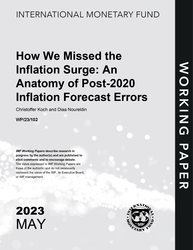
How We Missed the Inflation Surge: An Anatomy of Post-2020 Inflation Forecast Errors
How We Missed the Inflation Surge: An Anatomy of Post-2020 Inflation Forecast Errors
READ MORE...
Volume/Issue:
Volume 2023
Issue 102
Publication date: May 2023
ISBN: 9798400243233
$20.00
Add to Cart by clicking price of the language and format you'd like to purchase
Available Languages and Formats
| English |
Prices in red indicate formats that are not yet available but are forthcoming.
Topics covered in this book
This title contains information about the following subjects.
Click on a subject if you would like to see other titles with the same subjects.
Inflation , Labor , Economics- Macroeconomics , Economics / General , Inflation , Inflation surge , Forecast error , COVID-19 , Fiscal policy , core inflation error , forecasts of core and headline inflation , headline inflation from the International Monetary Fund , IMF working paper 2023/102 , Fiscal stimulus , Labor markets , Global
Summary
This paper analyzes the inflation forecast errors over the period 2021Q1-2022Q3 using forecasts of core and headline inflation from the International Monetary Fund World Economic Outlook for a large group of advanced and emerging market economies. The findings reveal evidence of forecast bias that worsened initially then subsided towards the end of the sample. There is also evidence of forecast oversmoothing indicating rigidity in forecast revision in the face of incoming information. Focusing on core inflation forecast errors in 2021, four factors provide a potential ex post explanation: a stronger-than-anticipated demand recovery; demand-induced pressures on supply chains; the demand shift from services to goods at the onset of the pandemic; and labor market tightness. Ex ante, we find that the size of the COVID-19 fiscal stimulus packages announced by different governments in 2020 correlates positively with core inflation forecast errors in advanced economies. This result hints at potential forecast inefficiency, but we caution that it hinges on the outcomes of a few, albeit large, economies.
Copyright © 2010 - 2026
Powered by:
AIDC



